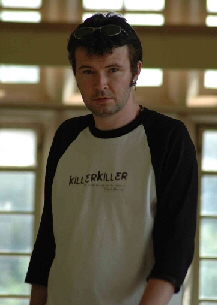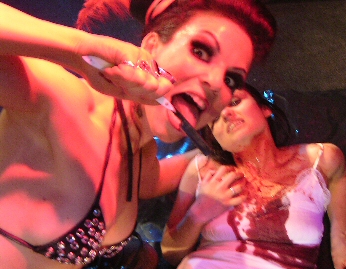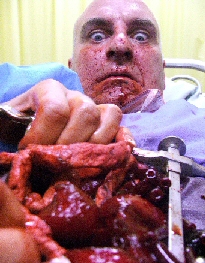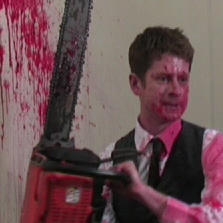by Stu Willis
Founded back in 2003, Jinx Media have been struggling ambitiously (with some growing success) to make their mark in the independent horror scene in the UK. Here Stu Willis, chats candidly to Jinx Media main man writer/director Pat Higgins about the indie scene and Jinx's plans for the future…

Stu: How did Jinx Media come into existence? How does someone with similar aspirations follow suit?
Pat: Making low-budget movies was something I'd always wanted to do, but it was one of those strange situations where things just dropped into place. I'd initially set up the company to deal with delivering stand-up comedy clips to mobile phones, but this was back in the early years of the decade, and the technology really wasn't in place to the degree that was needed. So I had a company just sitting dormant. I'd also been tinkering with the idea for TrashHouse (our first film) for years, but finally had a screenplay ready to go. I'd already quit my sensible job to go travelling the previous year, and it became obvious that if we were ever going to do this, at any point in our lives, now was the time. Anyone thinking of doing anything similar would be best off picking up The Guerrilla Filmmakers Blueprint by Chris Jones, which we still refer to around the office as the Blue Bible. It's a fantastic book and must have saved us thousands of pounds over the years.
Stu: What budget are you working within generally on your films?
Pat: Usually the sort of budget that you might use to buy a car, but what kind of car and in what condition varies an awful lot. It's not so much the budget as what you do with it, though; I firmly believe that if you were to watch all four films back-to-back and guess the order from lowest-to-biggest budget you'd probably get the order exactly reversed. Our cheapest flick looks like our most expensive and vice versa.
Stu: Your more recent films appear to be shot on HD Video. What is the benefit of this format over other formats?
Pat: I love shooting HD. It's cost effective and actually future-proofs your movie to some degree. Previous tape-based formats have always felt like a big compromise to me; sending out the message that you'd really rather be shooting 35mm, or even 16mm, but simply don't have the resources. HD, when handled properly, can look every bit as good as celluloid to my eyes yet you've still got all the advantages of shooting tape in terms of speed of working and cost. It's levelled the playing field no end.
Stu: With The Devil's Music, it was an interesting notion to combine a rockumentary/mockumentary with a horror film - how did this inspiration evolve?

Pat: I originally wrote the story as a novel, many years ago, entitled 'All The Best Tunes'. It was a far more straightforward narrative, nothing too tricksy about it. I liked the novel but never got around to doing more than a couple of drafts; it just sat in my bottom drawer for a few years and was never published. During post-production for TrashHouse I kind of came back to the idea and decided that I'd like to do something based on All The Best Tunes as my next movie. There's actually a hidden message, as a kind of statement of intent, about it in TrashHouse; in the scene where the character of Charlotte is holding a physics book that writes itself, the final equation that the book writes is something along the lines of "The Next One Will Be All The Best Tunes", but with all the vowels removed.
As it turned out, I ended up making Hellbride and KillerKiller in between. Then, in early 2007, we were looking for a project that could be shot over the summer but wouldn't involve any set-building or expensive effects. I grabbed the unpublished novel and set about turning it into a mixture of interviews and documentary footage. It wasn't a particularly tough job since I already knew the characters inside-out from writing the original novel, and I knew the narrative arc of the whole thing. My wife Pippa, who produced the movie, started pre-production whilst I was still working out the screenplay; I think we started shooting within about six weeks or so of deciding that we were going to do it.
Stu: Where did you find Jess Luisa Flynn, Lucy Dunn and Victoria Hopkins?
Pat: We auditioned those roles; we're creatures of habit, and have used the same function room in Southend to hold auditions for all four movies now. We tend to post a couple of low-key casting messages up on websites like UKScreen. There are an awful lot of amazingly talented actors out there just looking for a project to sink their teeth into; it's just a matter of finding them. We like reusing cast, too, which makes our lives easier. Although the three names that you mention were working with us for the first time, pretty much all of the smaller roles in The Devil's Music were taken by people we'd worked with before.
Stu: How do you finance your films?
Pat: TrashHouse was made with our savings. The fact that it made it out onto wide release DVD, and onto the shelves at Blockbuster, meant that it was easier to pick up private investment for the next couple. We're hoping to hit some kind of rhythm; where income from one directly funds the next, so we can just go on indefinitely, but it hasn't happened yet.
Stu: The Devil's Music is less explicit, I gather, than your previous three horror films. Was this a conscious decision? Can you explain the motive behind a more cerebral approach?
Pat: I think that partly came from the nature of the form; once we'd settled on the rockumentary approach, we realised that keeping certain elements low-key was the secret to keeping the thing believable. Believability came first, and all other considerations were secondary. If we'd have cut loose in the way we did in certain points of, say, KillerKiller, it would have blown the mood entirely.
Stu: I really enjoyed the approach of The Devil's Music. What research was involved? Was Erika's character based on anyone in particular?
Pat: I've got various friends who are involved in the music industry, and so I was able to prod them at various points during pre-production to check for authenticity. I really didn't want the flick to trigger anybody's horseshit detector. Erika's an amalgam of quite a few people; both people that I've met and celebrities I've researched. There are also a few aspects of her personality that are just 100% me, which is probably true of most of my characters.

Stu: With regards to your earlier films (which I haven't seen), could you describe how each one differs?
Pat: I consider that I've made a midnight movie (TrashHouse), a pitch-black thriller (KillerKiller), a romantic comedy (Hellbride) and a rock documentary (The Devil's Music). All four just also happen to be horror films, which probably sums up why I love the genre so much. I don't think there's another genre where you can introduce so many disparate elements but keep a sense of genre identity. All four are very different from each other, but they've got certain similarities that probably mark them out as clearly the work of the same creative team.
Stu: The Devil's Music, I felt, owed something to Asian horror in its final act. Do you agree?
Pat: It's wasn't a conscious thing, but I've got a lot of love for good Asian horror, and I agree that a lot of the recurring concerns that you often find in those movies (specifically regarding the origins and reliability of images) are definitely reflected in The Devil's Music, absolutely.
Stu: What was your working relationship with Phil Sheldon, who wrote the music for The Devil's Music?
Pat: Phil's a bloody genius. We first worked together on KillerKiller, which he scored for us in an extremely tight timeframe. I absolutely *love* that score; he took these incredibly cold images of the crumbling asylum and put this sparse, delicate melody over them. So many composers would have gone straight for doomy, oppressive chords, but Phil went for this kind of melancholic vibe that just changed the whole feel of the flick, particularly the first and the last scenes. In the case of The Devil's Music, I wrote the lyrics for Erika's songs and recorded these awful, misshapen lo-fi demos with an acoustic guitar and me wailing over the top. Phil took these demos and somehow came back several weeks later with studio-perfect, kick-ass rock music. Victoria recorded vocal takes, Phil produced and mixed the final versions and that was that. He played all of the instruments himself; he's just obscenely talented. We wanted him to be around for the 'live' sequences too, so that's him in the gasmask in Erika's touring band. A couple of the tracks can be downloaded from Erika's MySpace page .
Stu: Have you had much interest while submitting the film to festivals? Where can people expect to see the film?
Pat: Our submissions have only gone out in the last few weeks, so we haven't heard back from anywhere at all yet. Hopefully, it'll show at a couple of festivals at least before heading to DVD, but we're really not sure where yet. I'll keep you posted!

Stu: How much of The Devil's Music's script was ad-libbed? Alan Ronald and Cy Henty appeared very natural - as if they'd been given a basis to work from, then elaborated upon it?
Pat: The documentary sequences have a fair bit of elaboration along the lines that you suggest; we worked out that it was the best way to keep things fresh, alive and believable. The vast majority of the interview sections (particularly Cy's, actually) are more or less word-for-word what was in the screenplay. Cy's just incredibly good at naturalistic stuff and totally sells it. Sometimes, we'd play around with improv directly after shooting the screenplay material more or less verbatim. Outside of their movie work, Al and Cy are also a sketch comedy double-act known as The Electric Head, so they're very used to working with each other.
Stu: Was making The Devil's Music a filmmaker's wet dream? It felt like you had enormous fun, toying with various techniques while filming promo videos, archive TV footage, live concert snippets etc.
Pat: It was great, great fun. In the same way as we had to keep the violence on a more believable footing than in our other movies, we were able to completely cut loose in playing around with different forms. Music television, newspapers, concerts, whatever. Our stills photographer, Debbie Attwell, spent several days just photographing Erika's various different looks for different album publicity campaigns. There was a real feeling that we were making a fully developed past for these characters. And the Robin Harris promo video, all running through cornfields and looking thoughtful, still makes me laugh.
Stu: How elaborate was the shooting of The Devil's Music? There are quite a few characters involved - and quite a few different locations. But how many were actually involved?
Pat: The documentary sequences were a couple of very intensive weeks' work. We were shooting all over the country; wherever we could get the locations, that's where we went. It was tiring but very rarely less than fun. We had a great cast and crew who would put up with more or less anything at very little notice in order to get the shots in the can. The 'live' gigs were the toughest, and often had the tightest timeframes in terms of how long we could get the location for. Pippa was sometimes having to reorganise schedules on a few hours' notice if a location pulled out, most memorably swapping the next morning's shoot from Islington to Portsmouth. I'm still amazed she managed to pull it off. The interview sequences, by comparison, were a doddle. Some were shot in local pubs and clubs, at least two were shot in my own house. We could take our time with them and there was no pressure whatsoever.
Stu: Do you have any anecdotes from the shoot that you'd care to share?
Pat: Often after we'd got the takes we needed, we'd go off-script and into full improvisation to see if it led us anywhere interesting. A lot of that stuff was very funny but wrong tonally, so we couldn't actually use it; an increasingly heated debate between Alan Ronald's drummer character of ZC and the unseen interviewer regarding whether the title of ZC's solo album, 'ZC Listening', made logical sense is one that I really enjoyed. Along with Robin Harris (Scott Thomas) on a talk show, tears streaming down his face, explaining about his campaign for the welfare of pandas, "It Does Matter If You're Black & White". I'm sure it'll end up on the DVD at some point.

Stu: How do you go about getting a film distributed? I notice KillerKiller has a US DVD release (as Killer Killer)?
Pat: TrashHouse was picked up by Screen Entertainment and got a decent UK release, which certainly boosted our confidence that there was a market for our stuff. We sent out a handful of screeners for KillerKiller to US companies and actually got three different offers on the table in the first week.. We signed all worldwide rights to York Entertainment, who are still signing it to new territories all the time. Apparently, it was sold to Russia a few months back. I'm really curious to get hold of a copy of the Russian DVD, especially if it's dubbed... The market is incredibly crowded with indie horror stuff at the moment; you've got companies bundling literally dozens of unreleased movies together in a single package and it makes it very hard for newcomers to get noticed. Horror is still a genre with a devoted fanbase, though, and I think there'll always be a market for stuff that's genuinely trying to do something different. We're going to work out the DVD deals for Hellbride and The Devil's Music very carefully over the next few months.
Stu: If you could give a single piece advice to aspiring filmmakers, what would it be?
Pat: Don't accidentally record an important scene onto a head cleaner tape.
Stu: What are your ambitions, both for yourself and Jinx Media?
Pat: We've got three more movies lined up and ready to roll in the not-too-distant future; House on the Witchpit, BrainBath and Strippers vs Werewolves. BrainBath is a bigger scale project than the other two, and certainly the most ambitious thing that we've attempted. For both myself and the company, I want to keep making interesting and offbeat movies within the genre that I love. As long as we can keep making movies and get them out there to people, I'll be happy.
Stu: If you could remake The Devil's Music with a Hollywood cast of your choice, who would you enlist for each role ... and why?
Pat: That's a cracking question, but I've got to be a spoilsport and say I'd stick with the cast we had. Wouldn't change a single damn one of them. I'd just ship in a few thousand more extras for the gig scenes, and stick in a few helicopter shots. If any of the major studios fancy stumping up the cash, I'd do it in a heartbeat. Rock on,
Thanks to Pat Higgins and Jinx Media